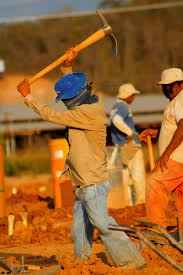How Blue-Collar Workers Are Redefining The Game In The New Age Workforce

The traditional notion of blue-collar jobs conjures images of manual labour in construction sites or skilled trades. However, today’s blue-collar workforce is rewriting this script, breaking free from the constraints of conventionality. It’s a compelling journey into uncharted territories, where these modern-day workers are challenging preconceived notions and embracing a diverse range of professions.
Gone are the days when blue-collar jobs were confined to traditional roles. Today, a new wave of workers is redefining the landscape, expanding their horizons beyond the conventional. Let’s delve into the exciting realm of new-age blue-collar job seekers and explore how they’re making their mark in the evolving world of work.
How Blue-Collar Job Seekers Are Expanding Their Horizons
Diverse Roles In The Blue-Collar Sphere
Welcome to the era where blue-collar workers aren’t confined to the stereotypical toolbox. It’s not just about wrenches and hammers anymore; it’s about a diverse range of roles that stretch across industries and redefine what it means to work with your hands.
In the past, blue-collar jobs were often associated with a limited set of tasks, but today’s workers are shattering those boundaries. From the skilled technician troubleshooting complex machinery to the artistic craftsman bringing creativity to construction projects, the spectrum has expanded. The once one-dimensional toolbox has evolved into a multi-dimensional toolkit of skills. Now, being a blue-collar worker is synonymous with versatility and adaptability, as these professionals confidently navigate various fields, proving that their expertise goes far beyond the traditional confines of a toolbox.
In the contemporary workforce, blue-collar workers are boldly and confidently venturing into diverse fields, reshaping the narrative surrounding their roles. Here’s a closer look at how these dynamic professionals are navigating various industries with confidence:
- Embracing Technological Advancements:
Blue-collar workers are not shying away from technology; instead, they’re embracing it. From using cutting-edge tools and machinery to adapting to digital platforms for communication and project management, these workers are proving that a tech-savvy approach enhances their efficiency and effectiveness.
- Diversifying Skill Sets:
Beyond the traditional skill sets associated with blue-collar jobs, workers are diversifying their skills. This adaptability allows them to move seamlessly across different fields, leveraging their experience and expertise. For instance, a skilled electrician might explore roles in renewable energy, showcasing the versatility of blue-collar professionals.
- Participation in the Gig Economy:
Blue-collar workers are tapping into the gig economy, taking on short-term and project-based work. This allows them to explore various fields, gain diverse experiences, and build a portfolio of skills. The gig economy provides flexibility and independence, empowering workers to navigate different sectors.
- Cross-Industry Collaborations:
Collaboration is key, and blue-collar workers are actively participating in cross-industry collaborations. Whether it’s partnering with tech companies, manufacturers, or service providers, these professionals are contributing their unique skills to diverse projects, fostering innovation and creating a ripple effect across industries.
Blue-Collar Jobs In The Digital Era
Who said technology is only for those behind a desk? The digital era has welcomed blue-collar workers into the tech revolution with open arms. Forget the notion that blue-collar jobs are solely about physical prowess; now, it’s about mastering digital tools that enhance efficiency on the job.
Specialised apps have become the go-to for project management, allowing workers to streamline tasks and collaborate seamlessly. Whether it’s tracking inventory, managing schedules, or coordinating with team members, these digital tools have become the backbone of blue-collar operations. Technological literacy is no longer optional; it’s a valuable skill that blue-collar workers are embracing with enthusiasm, proving that the digital realm is as much their playground as anyone else’s.
The stereotype of blue-collar workers exclusively relying on traditional tools is rapidly dissipating as a new era unfolds. Blue-collar professionals are not only embracing technological literacy but doing so with a contagious enthusiasm. Here’s how this shift is reshaping the landscape:
- Integration of Smart Tools:
Blue-collar workers are incorporating smart tools and technologies into their daily operations. From advanced machinery on construction sites to digital diagnostic tools for mechanics, these workers are demonstrating a keen interest in adopting technological solutions that enhance efficiency and precision.
Organisations like the Construction Industry Development Council (CIDC) or the National Institute of Construction Management and Research (NICMAR) provide insights into the integration of smart tools in construction companies.
- Training Programmes and Workshops:
Recognising the importance of staying updated in a tech-driven world, blue-collar workers are actively participating in training programmes and workshops. These initiatives focus on enhancing their digital literacy, ensuring they are well-versed in the latest technologies relevant to their fields.
- Digital Communication Platforms:
Traditional communication methods are giving way to digital platforms. Blue-collar workers are utilising apps, messaging platforms, and collaborative tools to streamline communication on job sites. This not only improves efficiency but also fosters better coordination among team members.
Reports from organisations like NASSCOM or industry-specific research firms shed light on the percentage of blue-collar workers using digital communication platforms in logistics, manufacturing, or other sectors.
- Adoption of Automation:
Automation is no longer exclusive to white-collar industries. Blue-collar workers are embracing automated systems in manufacturing, logistics, and other sectors. This not only augments their productivity but also requires a level of technological literacy to operate and troubleshoot these systems effectively.
Learning On The Job: Continuous Skill Development
In the fast-paced world of blue-collar work, standing still is not an option. Today’s blue-collar job seekers understand that continuous learning is the key to staying ahead. It’s not just about what you knew when you started the job; it’s about what you’re willing to learn on the job.
On-the-job training has taken a front seat in the career journey of new-age blue-collar workers. Whether it’s mastering a new piece of machinery, staying updated on the latest safety protocols, or acquiring certifications in specialised skills, these workers are committed to evolving with their roles. It’s not a one-time deal; it’s a continuous commitment to growth and adaptation, ensuring that they remain at the top of their game.
Blue-collar workers are demonstrating a remarkable commitment to evolving with their roles, dispelling the notion that their professions remain static. Here’s a closer look at how these dedicated individuals are actively engaging in their own evolution:
- Continuous Learning Initiatives:
Blue-collar workers are proactively seeking out opportunities for continuous learning. Whether through formal training programs, workshops, or online courses, they are investing time and effort in acquiring new skills and staying abreast of industry advancements.
- Adaptation to Advanced Machinery:
As technology transforms the workplace, blue-collar workers are embracing advanced machinery and equipment. From mastering the intricacies of automated systems to incorporating cutting-edge tools, they are committed to evolving with the technological shifts in their fields.
- Cross-Training and Skill Diversification:
Recognising the importance of versatility, blue-collar workers are engaging in cross-training initiatives. This involves diversifying their skill sets to be proficient in multiple aspects of their profession, making them more adaptable to changing job requirements.
- Participation in Certification Programs:
Many blue-collar workers are actively pursuing industry certifications. These certifications not only validate their expertise but also serve as a testament to their commitment to professional development and adherence to industry standards.
- Integration of Sustainable Practices:
In response to the growing emphasis on sustainability, blue-collar workers are evolving by integrating eco-friendly practices into their roles. This may involve adopting green building techniques, energy-efficient technologies, or environmentally conscious waste disposal methods.
Side Hustles And Entrepreneurial Spirit
Gone are the days when blue-collar workers were solely employees; now, many are donning the hat of business owners. The entrepreneurial spirit is alive and well in the blue-collar workforce, where skills are not just a means to employment but a pathway to independent ventures.
From carpenters launching their own woodworking businesses to plumbers establishing plumbing services, blue-collar professionals are exploring their entrepreneurial sides. This shift isn’t just about working for someone else; it’s about using their skills to create something of their own. The blue-collar worker of today isn’t just punching a clock; they’re building their own path, proving that the traditional employment model is no longer the only blueprint for success.
Diversity And Inclusion
Blue-collar professions are shedding their traditional image as male-dominated fields. Today, diversity and inclusion are at the forefront, breaking down gender and racial stereotypes to welcome individuals from all backgrounds into the fold.
Traditionally seen as jobs for men, the landscape is changing as more women join the ranks of blue-collar workers. Whether it’s a female electrician excelling in wiring installations or a woman breaking barriers as a skilled mechanic, the blue-collar world is becoming more inclusive. The once rigid boundaries are now flexible, allowing talent to shine regardless of gender or background. It’s not just a job; it’s a movement towards equal opportunities and recognition for all.
The blue-collar world is experiencing a positive shift towards greater inclusivity, breaking away from traditional norms and embracing diversity. Here are key aspects illustrating how inclusivity is taking root in the blue-collar sector:
- Gender Diversity:
Traditionally male-dominated fields within the blue-collar sector, such as construction and manufacturing, are witnessing a welcome influx of women. Initiatives promoting equal opportunities, targeted recruitment efforts, and the breakdown of gender stereotypes are contributing to a more gender-inclusive workforce.
- Diverse Skill Sets and Backgrounds:
Employers in blue-collar industries are increasingly valuing diverse skill sets and backgrounds. Instead of focusing solely on specific experiences, there’s a growing recognition that individuals from various backgrounds bring unique perspectives and skills that can contribute to the success of the team.
- Accessible Training and Skill Development:
Inclusivity extends to training and skill development programs. Efforts are being made to ensure that these programs are accessible to individuals from different socio-economic backgrounds. This may involve providing financial assistance, offering flexible training schedules, and creating inclusive learning environments.
- Cultural Awareness and Sensitivity:
Employers are recognizing the importance of cultural awareness and sensitivity in creating an inclusive workplace. This includes acknowledging and respecting cultural differences, providing language support where needed, and fostering an environment where everyone feels valued.
Remote Work
Think remote work is only for those in offices? Think again. Blue-collar workers are embracing the virtual realm, leveraging technology to carry out their tasks from the comfort of their homes.
With the advent of connectivity and digital tools, many blue-collar jobs can now be performed remotely. Whether it’s a technician diagnosing issues through virtual inspections or a craftsman creating designs from home, the traditional notion of blue-collar work tied to a specific location is evolving. Remote work is no longer exclusive to the corporate world; it’s a reality for blue-collar professionals, providing them with flexibility and a better work-life balance.
- Adoption of Remote Technologies:
Many blue-collar jobs involve hands-on work that traditionally requires a physical presence. However, certain roles within blue-collar industries, such as administrative tasks, customer service, and project management, have seen an increased adoption of remote technologies.
- Challenges in Complete Remote Transition:
Some blue-collar jobs are inherently location-bound due to the nature of the work (e.g., manufacturing, construction). Complete remote work may not be feasible for these roles, leading to a hybrid model where certain tasks can be performed remotely while others require on-site presence.
- Flexibility in Scheduling:
In cases where remote work is possible, there has been an increased focus on flexible scheduling. This allows blue-collar workers to balance their on-site duties with remote administrative tasks, providing a more adaptable approach to work.
- Innovation in Training and Collaboration:
Remote work has prompted innovation in training methods for blue-collar jobs. Virtual reality (VR) and augmented reality (AR) technologies are being explored to facilitate remote training for tasks that traditionally required hands-on instruction.
Unlock New Horizons With Mentoria
The blue-collar workforce is not just clocking in and out; it’s embracing a dynamic shift towards innovation, technology, and continuous growth. As new-age workers redefine traditional roles, the future looks promising for those ready to adapt and seize opportunities in the ever-evolving job market.
Mentoria’s personalised career guidance can be your compass. Mentoria’s career guidance programme enables you to choose your perfect fit from 3 streams, 850+ courses, and 12,000+ careers, and discover what will bring out the best in you.









